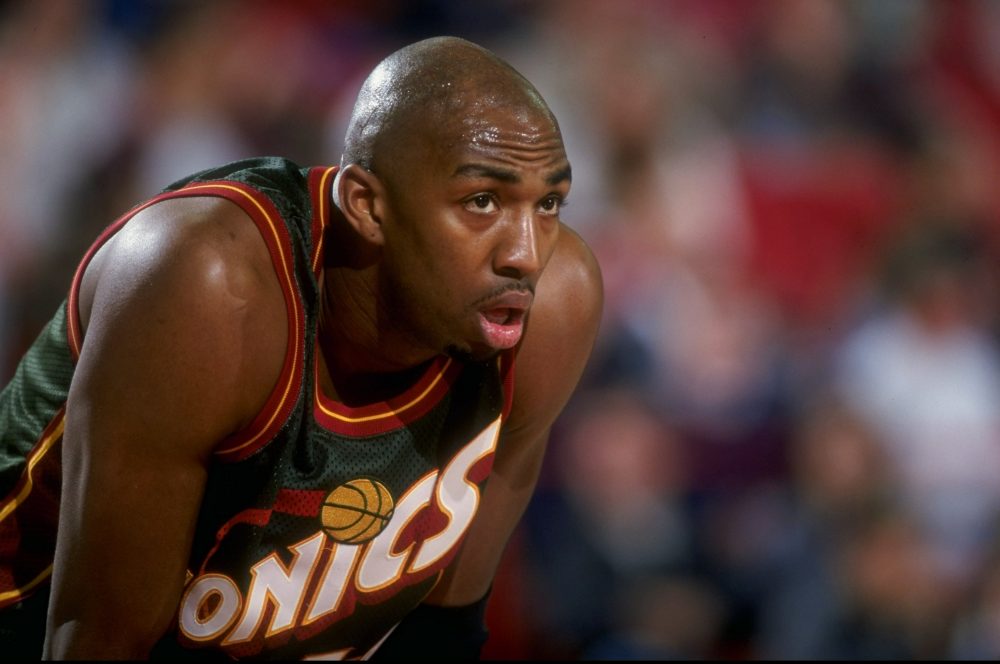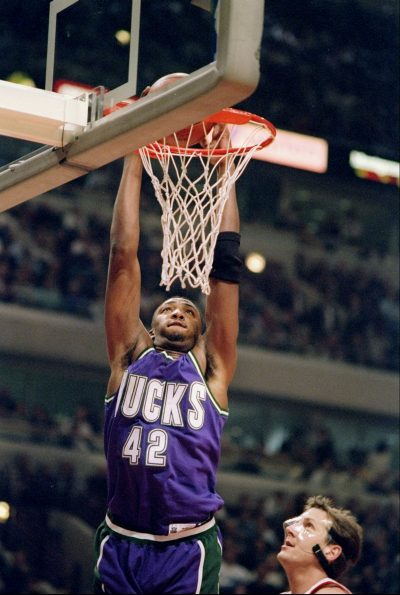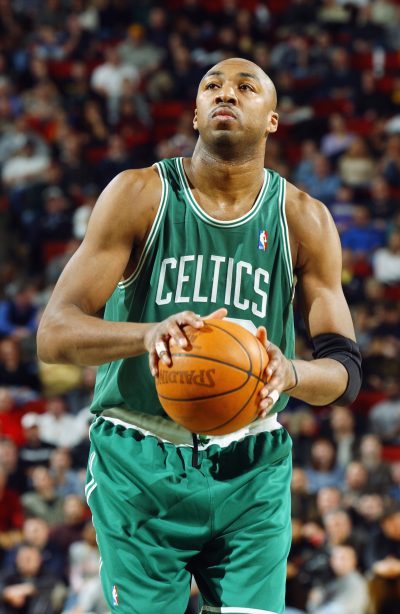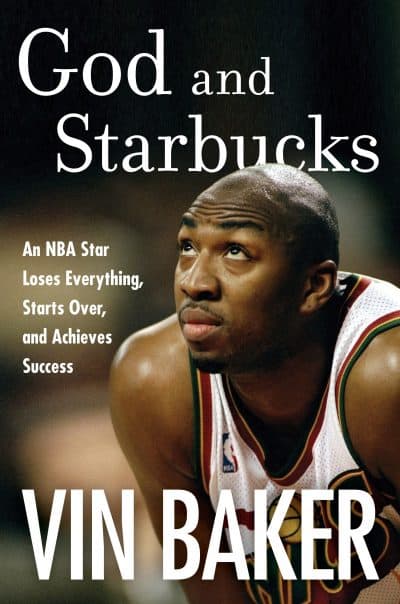Advertisement
From NBA All-Star To Starbucks Barista: Vin Baker's Journey To Sobriety
Resume
Listen to OAG anytime. Subscribe to the podcast. iTunes | Stitcher | RSS link
According to Wikipedia, Vin Baker’s basketball career was "damaged due to substance abuse."
Wikipedia’s not known for precision — OK, accuracy — but in this case, the fault is understatement.
But when we spoke recently, Baker didn’t want me to lose his message in the ugly details.
"So many people wait for the trainwreck," Baker says. "Like, in my situation, we wait for 'Vin Baker’s lost money. Vin Baker’s house foreclosed on.' But when I get a chance to turn the story around, and I fight my butt off and get to 6 1/2 years sobriety, I get it. I understand what people want to hear. But the fact of the matter is, I’m here to shed light on recovery and speak to a world where sometimes people don’t want to be honest."
Scoring 41 Points Stoned

For a long time — almost too long — Vin Baker was one of those people who didn’t want to be honest. Now, he’s opening up about, for example, the first time he played an NBA game high. It was Jan. 5, 1996. He and several of his Milwaukee Bucks teammates had gathered at forward Glenn Robinson’s place to get haircuts. There would be a game that night. Baker says Robinson was smoking marijuana. Baker, who’d never before indulged on the day of a game, joined in ... and then began to worry about how he’d play that night.
"Went to the game feeling kind of disoriented," he says. "It was the anxiety of, 'Am I going to be walking on air? Am I going to pass out?'"
Nope. Neither of the above. Baker, about half-stoned, shot out the lights.
"Statistically, it was my best game ever as a pro. I scored 41 points," he says. "It was a weird coming out party for me, because in some ways it said, 'Wow, I’ve arrived on this level, to score 40 points, which is a big deal in the NBA.' But at the same time, the cost of arriving, I didn’t see that night."
A year later, the 6-foot-11 Baker, whom the Bucks had picked eighth overall in the 1993 draft, was traded to the Seattle SuperSonics. There he averaged just under 20 points per game. Which was, at least in retrospect, astonishing, because while he was playing for the Sonics, Baker was drinking before, after and sometimes during games.
That didn’t go entirely unnoticed — sometimes Baker’s teammates could smell alcohol on him at practice — but management saw only his upside. In 1999, Seattle signed Baker to a contract worth $86 million over seven years.
Out Of The NBA
But three years later, Seattle dealt Baker to Boston, where he underwent a physical. The doctor employed by the Celtics found signs of liver damage associated with alcoholism.
"And, of course, being in the state I was, I lied and said, 'No, there’s no issues, and I’m not drinking as much as you guys may think,'" Baker recalls.
Baker says the doctor told him, "Of course, if you play better, this all goes away."
Baker also recalls that in 2003, two men hired by the league to surprise him with random drug tests told him they’d warn him about when the tests were coming if he’d pay each of them $50,000. He thought about it.
In any case, he didn’t play better. By then he was constantly drunk or hungover. He became a part-timer the Celtics could do without. Eventually he began drinking Listerine, figuring nobody would complain about the odor.
Over the next two years, the Knicks, the Rockets and the Clippers came to the same conclusion the Celtics had reached.
In 2006, Baker was out of the NBA. His substances of choice had multiplied to include Xanax, Librium and pretty much whatever else he could find to help him forget what might have been. He spent his days, as he says, "shuffling around" an empty house "in slippers and sweats" with a glass of cognac in his hand. He was, he says, "skeletal." He vomited blood a lot.

And then, Vin Baker made what he figures was about his sixth attempt to get sober.
"What was different about the time that worked?" I ask.
"Well, I think I had to take out all the conditions that weren’t realistic," he says. "So, in other words, 'I gotta get sober to save my career.' 'If I get sober I’m going to be an All-Star again.' Those are, like, some of the crazy thoughts I had when I was in Boston."
This time he didn’t put conditions on it. For a hard year and a half, Baker maintained his sobriety. Then he began thinking about an additional goal.
"I needed to get back into a place to provide for my family and for my kids," he says.
OK, good intention. But who was going to employ him? Baker came up with the name of a former boss, Howard Schultz. He’d owned the SuperSonics when Baker had played in Seattle, and Schultz also ran a coffee company. Place called Starbucks.
Caramel Macchiatos And Coffee
"It must’ve took me about a month to call Howard," Baker says. "I was like, 'What am I going to say? And I had just left bible study at my church in Old Saybrook, and I pulled over, got my nerves together. I prayed. And I called him, and his voice — he was excited. He was like, 'Vinny!' And I’ll never forget his excitement in his voice. And he said to me, 'You sound great!' Like, 'You sound terrific!'
"We met. And we came up with a plan. And we exercised that plan, and part of the plan was to make caramel macchiatos and serve coffee at Starbucks."
Vin Baker went into the management training program. That meant he showed up dependably. And, as with his job in pro basketball, he put on a uniform.
"To actually grab the green apron — that was a little bit short, by the way — grab the green apron and throw it on and then walk out, it was surreal," Baker says.
"Surreal," as in getting up at 3:45 a.m. to open the store. And, at least initially, Baker didn’t even like the taste of coffee. But he handled the job.
"From the work perspective, it wasn’t that difficult. Because I don’t mind working," Baker says. "But, obviously, the story behind it was difficult some days, but I ultimately said, 'This is all for the best.'"
"Do you remember what the figure was on your first paycheck from Starbucks?" I ask.
"I don’t. Um, I don’t remember," he says with a chuckle. "I can tell you this: same signature from Howard, but it wasn’t the same amount as I got when I worked for him in Seattle. I can tell you that much."
"A couple of zeroes missing," I say.
"Yeah, a few zeroes missing."
Recovery, One Day At A Time
Vin Baker can laugh now. He’s been in recovery for 6 1/2 years. And he’s not much inclined to look back at the nearly $100 million he lost.
"I’m not going to be on the cover of Business Insider or Forbes any time soon, but that’s OK with me. Right? That’s OK with me," Baker says. "Because in the world of recovery, we don’t talk dollars and cents. We talk recovery, one day at a time. Win the day. So when I got the job at Starbucks as a store manager in training, it was the upswing. I was happy. I was ecstatic.
"I came from a dark, dark place. And to be able to open a store up at 4:30 in the morning, 5:30 in the morning, and run a shift, and be responsible for a store is a big deal to a person in recovery. You know, it talks about responsibility. And so, it wasn’t $100 million to Starbucks. It was, 'Wow, I’m the store manager at Starbucks.' That’s how I felt when I went in there every day to work."

People would recognize Baker, of course. There aren’t a lot of 6-foot-11 baristas. Probably also not a lot of baristas of any height as happy as Vin Baker was to have a job. Which, he eventually began to understand as more than a job.
"At some point, I realized I might be the face of hope," he says. "Like, at some point, you have to take it on, the responsibility of, OK, everything has happened. I had this amazing career. I had all this money. And that’s fine. And it’s gone. But now there are people that are like 'Wow, it’s an inspiration.' And I enjoyed it. I embraced it. If every day I walk out of here and I’m showing up on time, people will go home and they’ll Google, and they’ll say, 'Holy cow.'"
These days, those inclined to see Vin Baker and say "holy cow" are out of luck if they’re looking for him at Starbucks. He’s moved on to broadcast and development work with the Milwaukee Bucks, another former employer happy to see him healthy. He’s working with a group to open rehabilitation centers in Milwaukee and New Haven. And Baker’s reasons for gratitude don’t stop there. His son, Vin, Jr., will be playing basketball and studying this year at Boston College, much to Baker’s delight.
"Ah, man, I cried. It’s one of the top five moments in my life to have my son sign at B.C." he says. "When you see things like this happen in your life, with your kids, like, I don’t think about losing whatever I lost in the past or whatever I did in the past. I’m looking like the choices that I made to get sober are now starting to pay off in my kids’ life. And so that’s what makes me excited each and every day about living a sober life."
Learn more about Vin Baker’s story in his recent book, "God and Starbucks: An NBA Superstar’s Journey Through Addiction and Recovery."
This segment aired on September 1, 2017.
